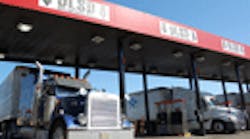Despite an increase in holiday travel and oil market uncertainty created by the sudden death of North Korean dictator Kim Jong Il, diesel and gasoline prices continue to fall in the U.S.
The average U.S. price for diesel dropped nearly seven cents to $3.828/gal. this week from $3.894 during the week of Dec. 12, according to data tracked by the Energy Information Administration (EIA) and down over 11 cents from $3.931/gal. during the week of Dec. 5.
However, the agency noted that diesel costs 58 cents more per gallon this year compared to the same time period in 2010.
California is now the only state where diesel costs over $4/gal. (dropping to $4.047 this week), though diesel remains close to the $4 mark in four other regions of the U.S., EIA said – New England ($3.995), the West Coast ($3.992), Central Atlantic ($3.963), and the Rocky Mountain region ($3.913).
Gasoline still remains much cheaper than diesel, the agency added, with the average U.S. price falling nearly 6 cents to $3.229/gal. compared to $3.286 last week and $3.290 during the week of Dec. 5. EIA noted that gasoline is still more expensive compared to 2010, with the average pump price 25 cents higher per gallon this year compared to the same time period last year.
Diesel and gasoline prices remain on the downswing due to a variety of factors, including reduced demand and lower oil prices. Oil is currently hovering around the $95 per barrel mark, down from over $100 per barrel earlier this month, mainly due to fears of a potential recession among debt-laden European nations, which would significantly reduce petroleum demand, according to energy analysts.
However, the uncertainty sparked by the sudden death of North Koran dictator Kim Jong Il may increase upward pressure on oil prices depending on how political power in that nation transitions to his son Kim Jong Un, analysts noted.
The relative stability of the world’s oil supply is also helping mitigate severe price swings as well, noted Abdalla S. El-Badri, secretary general of the Organization of Petroleum Exporting Countries (OPEC), in a speech earlier this month at the 20th World Petroleum Congress in Dubai.
“This year has seen the oil market in a constant state of flux: the ups and downs of the global economic recovery; Japan's multiple disasters; unrest in parts of North Africa and the Middle East,” he said.
“What has been apparent, however, is that there has been no shortage of oil anywhere in the world,” El-Badri noted. “Libya's shortfall earlier this year was met by other OPEC member countries, and Libya is now quickly returning its production and export capacity to the market. Spare capacity has been, and remains, at comfortable levels.”
He also believes the average price level for oil this year is at a “satisfactory” level for both producers and consumers. “It is at a level that allows producers to invest to meet future demand, and at the same time, it does not impede the global economic recovery,” El-Badri said.




